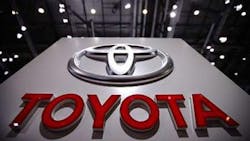TOKYO -- The world's largest automaker, Toyota (IW 1000/8), announced today that it hit a record annual profit after more than doubling its nine-month earnings to $15 billion thanks to the yen's sharp decline and surging sedan sales.
The buoyant results underscore a recovery not only for the Camry and Corolla maker but also for rival Japanese auto giants including Nissan and Honda.
The triohave been big winners over the past year as a sharp drop in the yen inflated exporters' repatriated profits, further boosted by improved overseas demand in key markets including the United States and China.
Sales in China fell off a cliff in late 2012 and into last year as a Tokyo-Beijing diplomatic row sparked a consumer boycott of Japanese brands in the world's biggest vehicle market. Relations remain tense, but Japanese manufacturers have reported sales are returning to pre-spat levels.
On Tuesday, Toyota said it earned 1.52 trillion yen (US$15 billion) between April and December on sales of 19.12 trillion yen -- propelled by a five-fold jump in third-quarter earnings.
It also boosted its fiscal year to March profit forecast to a record 1.90 trillion yen.
The automaker has ramped up its drive to tap emerging markets while key U.S. demand has also been on the upswing, but analysts point to Japan's April sales tax hike and unrest in Thailand as possible headwinds.
"In addition to the positive impact of the weaker yen, our operating income increased due to marketing efforts that boosted vehicle sales, as well as cost-reduction activities," Toyota managing officer Takuo Sasaki said.
He added that there "is a sense that the European market is bottoming out" as sales improve in the U.S. and China.
Headwinds on the Horizon
Toyota last month said it had kept the title of world's biggest automaker with 2013 sales of 9.98 million vehicles, outpacing Germany's Volkswagen and General Motors, and said it expects this year to become the first to break the 10 million vehicle sales barrier.
On Friday, Volkswagen, which had been sitting in number-three spot, said it sold 9.73 million vehicles last year, ahead of GM's 9.71 million.
Toyota broke GM's decades-long reign as world's top automaker in 2008 but lost the crown three years later as Japan's quake-tsunami disaster hammered production and disrupted the supply chains of the nation's automakers.
Toyota also took a heavy blow from a series of mass recalls affecting millions of cars that damaged its once-stellar reputation for quality and safety and led to U.S. congressional hearings in 2010.
Last week, Honda said its nine-month net profit surged almost 40% to 403.60 billion yen, thanks to brisk global sales and a weaker yen.
Nissan, which depends on China for about one-quarter of its sales, reports its financial results next week.
Despite the buoyant figures so far, an April sales tax hike in Japan and possible slowdown in U.S. and Asian markets could put the brakes on sales, said Takaki Nakanishi, analyst and chief executive at Nakanishi Research Institute in Tokyo.
"The Japanese auto industry has been on the upswing thanks to the weak yen and strong demand in the US and Asia, including in Japan," he said.
"But there are some negatives on the horizon. The sales tax hike in Japan will affect auto sales for sure, although I think the impact is likely to be limited. Also, the recent strong demand in Asia and America is likely to lose its momentum."
Gains from the weak yen will taper off, he added, while political unrest in Thailand, a major production base for Japanese automakers, could also dig into results.
Domestic Japanese auto sales jumped by more than a quarter in January from a year earlier, as consumers rush to buy new vehicles before sales taxes rise to 8% from 5%.
The rate hike is widely seen as crucial to bringing down Japan's eye-watering national debt, but it has also stoked fears of a drop-off in consumer spending just as Japan's economy is recovering.
-Shingo Ito, AFP
Copyright Agence France-Presse, 2014
About the Author
Agence France-Presse
Copyright Agence France-Presse, 2002-2025. AFP text, photos, graphics and logos shall not be reproduced, published, broadcast, rewritten for broadcast or publication or redistributed directly or indirectly in any medium. AFP shall not be held liable for any delays, inaccuracies, errors or omissions in any AFP content, or for any actions taken in consequence.
